- Home
- Giles Foden
Zanzibar Page 4
Zanzibar Read online
Page 4
‘Those are his?’ asked Nick. ‘So, what happened to him exactly? I’ve been hearing conflicting stories.’
The manager appeared to ignore him. ‘There are some clothes in the closet. I did not know what to do with them.’
‘The USAID guy – what happened?’ repeated Nick.
Da Souza went over to the window and drew the curtains. Through the glass came the intense glare of the beach and, beyond it, the green of the sea, calm and glittering except for a ruff of surf far out, folding voluptuously into its own foam.
‘He drowned, sir.’
‘I know that. But what were the circumstances?’
Da Souza had his back to him, his white suit framed by the seascape.
‘It has been said he was chasing poachers, sir. But nobody knows for certain. His boat was stove in. Some say there was a storm and his boat hit rocks. It was seen, eventually, half full of water.’ He hesitated. ‘Mr Darvil’s body – was on the reef.’
Da Souza turned and walked forward, taking Nick’s hand like a child.
‘Oh sir, it was very sad. You must take care in your employment. You will find the boat on the beach outside. The blue painted one. It needs to be fixed.’
He paused, then added brightly, ‘Mr Leggatt, he towed it in. He has a clove farm at Mtoni.’
‘Chikambwa mentioned him,’ said Nick, disengaging himself politely.
He was still wondering why USAID hadn’t gone into more detail about George Darvil. Maybe they, too, had never known the full story.
‘Well, I suppose I should get settled in.’ He pointed at a squat brown box in the wall. ‘That an air conditioner?’
Da Souza smiled. ‘Yes, sir, but it will work only when generator is running. Is best if you just open the window. Natural air conditioning.’
‘Yeah, well. I always thought those things poisoned you anyway.’
The dapper little manager had crouched down; he was trying to open the French windows. One of the bolts was stuck. As he fiddled with it, he gave a little curse in a language Nick didn’t understand. Chikambwa had said da Souza was Goan. What did they speak in Goa?
‘Don’t worry,’ said Nick, crossing the room to look, over the creamy fabric of da Souza’s shoulder. ‘I’ve got a knife in my bag. I’ll open them later.’
In fact, he did so as soon as da Souza had left him, quickly bundling snorkel, fins and swimming trunks out of his bag, onto the bed, delving for his Rapala clasp-knife. Opening it with his thumbnail, he knelt down and lifted the bolt with the back of the blade. Then, with a push, and some small resistance, the windows were wide open.
It was an exciting moment, those glass doors springing free; it seemed to clear his mind. He could smell the sea so strongly now. That, and the sight of it – the hypnotic return of waves of unnameable shades of blue, some craft, an outrigger maybe, traversing the distance – were at once humbling and intoxicating.
Changing quickly and grabbing his snorkelling gear, he stepped out onto the veranda. Now he could see it all. Either side of the veranda’s flaking paintwork, the beach gave out – an expansive whiteness. It had a deceptive, almost liquid appearance in the heat, as if it were melting, constantly spreading on either side. Pulled up above the waterline, which was marked with straggles of black seaweed, were several Zanzibari fishing boats of the type he had glimpsed further out. He was right. They did have outriggers and, sticking out from their prows, paraffin lanterns for night fishing. There was another boat, too, on the ribbed sand, a blue one with a gash in its side … that must be Darvil’s, he thought. Nick had a sudden vision of him – all sodden skin and glittering eyes, rising from the torn hull of the boat.
Dismissing the image, he looked out to sea again. Luminous, extending to a distant horizon of flat cloud, it gave an impression of incredible power. It was sound that did this – not the sound of the nearby waves, lightly throwing themselves forward and withdrawing on the shore, but the constant noise of the surf where, half a mile out, rollers crashed against the reef. The surf-line was like another bank of cloud, he reflected, his gaze following it under the horizon. Only this white wasn’t flat; it was alive, moving – continuously, like a loop of film endlessly replaying itself.
With mask and snorkel pushed up over his forehead, fins and towel under his arm, Nick stepped out from under the veranda’s straw roof, down some warped wooden steps, and onto the sand. It was as soft as talc, running hotly over the bridge of each foot as he walked.
Reaching the sea, he tossed the towel onto a twisted piece of driftwood and – with his fins under his arm – walked directly into the water. It covered his body, the waves so gentle that they hardly moved him as, sitting in the shallows, he put on the fins. He pulled down the mask and dived.
Sea light. Sea life, too, but not much of it. He looked from side to side through the oval of the mask. The first thing he saw was a starfish, clinging to a rock. They never failed to make him think of someone’s hand, fingers outstretched. Then: nothing, just the white bed of sand, dotted with more rocks. He swam on a little – to where, edging down, the sea floor began to shelve. He felt ghostly, knowing again that pull of the waves in his blood – an immemorial, homeland sense that went beyond words, beyond explanation.
The splash of a cormorant shook him from his reverie. He watched its brown shadow trigger through the water. A flash of silver signified the fish that was taken, the fish that he hadn’t even noticed; all this he realised later, once the bird had gone. At least it meant there were fish about; he had been getting vaguely anxious. He had seen more in Sarasota Bay.
Then, as if some whimsical deity of the deep had decided to salve his anxiety, he spotted something intriguing. Below him on the seabed were two glassy green lumps: as if somebody had taken a couple of spoonfuls of jello and, very carefully, half covered them with sand. Taking a breath through the snorkel he swam down, enjoying the familiar pressure in his head. He was about half way to the lumps when the sand abruptly levered up beneath him – lifted up flat before dispersing in a fizzing cloud. Out of the turbulence – slowly appearing, then sliding away at some speed – came a black rubbery triangle. Two metres across, it tapered to a long, thin tail.
Exhilarated, Nick watched the ray scoot across the sand, tail dragging behind it like an old-fashioned radio aerial. He powered himself forward in pursuit, kicking on until he was out of breath and had to come to the surface, blowing water out of his snorkel with an aggressive burst. He turned over and let the sun play on his stomach for a while, then spun round once more, to face the reef.
It took him about a quarter of an hour to reach it. Every minute, as he approached the line of battered coral, was like a revelation. As the skeleton of the main reef came closer, fish of every description began to weave around him. Some were breathtakingly beautiful, with names that told their story – butterfly fish, parrot fish, angel fish. Others were unlovely, but no less fascinating; and, once again, deserving of their names: groupers, puffer fish, goatfish, grunts …
At the reef itself, a school of blue-lined yellow snappers enveloped him, some hundred strong. The way they brushed him tenderly with their fins was almost like a greeting. He dived down to inspect the reef more closely, and the blue-yellow cloud billowed around him. There were different species amidst the coral. Many, such as the surgeon fish, with its sharp beak and beady eye, simply ignored him and kept on grazing. Others, like the nervous trigger fish, fled immediately on his approach. He swam along the vertical coral wall, glad that he had come without the full scuba gear. There was something liberating about doing this with light snorkelling tackle.
He felt blessed. It wasn’t just the fish. The reef itself was no less absorbing. It had the massive, accumulated energy of a great building. Like something in Rome or London. Maybe it was the way a reef built up, trapping sunlight over hundreds of years to produce calcium carbonate, a cathedral of light. Even the dead parts of the wall were alive in their way, offering a surface on which algae could breed and, corresp
ondingly, fish could feed.
The skeleton itself was fantastically complex: staghorn, plate, table, brain. Every type of coral he knew was here. Distinct yet conjoined, mainly white but streaked with the remnants of plant pigments, it really was like an edifice, the battlements of some elaborate castle out of a legend of doubtful authenticity – supreme production of a colossal empire, itself on the verge of a continuing, accelerating fall. But it was always changing its appearance: no comparison would hold. He floated along the side, holding his breath till, lungs bursting, he kicked his way to the surface.
He cleared his snorkel and swam on a little, enjoying the sun on his back. Then, taking in a giant breath, he dived again. Round him now in shafts of sunlight were species of living soft corals, transparent, or the faintest pink and lilac. He watched where the polyps reached out to collect plankton, flailing like a blind person or a baby in its cot. Only they weren’t blind. They knew. And the sponges knew, and the anemones, and the sea squirts. Everything was part of the system, and the system itself gave a kind of sentience, a sense of what they were about, to each of its constituent parts.
He floated up, letting the current carry him over the reef. And then, suddenly, it was blown away, the little fantasy world he had been building for himself. Here the reef had been destroyed. Here the wall was gone, missing for a good hundred metres. Broken pieces of coral were scattered on the ocean floor. There were no fish at all now. Nothing. The light had changed, too, become the fearful grey of a sea in mourning for itself.
Dismayed, he tried to imagine how it had happened: how the fishermen had come out one morning and, lighting the fuses in their waterproof casements, dropped the sticks over the side. How they had hurriedly rowed their boats to a safe distance to watch the water erupt in a foamy mushroom. Afterwards, the harvest: spreading their nets on the astounded surface and waiting for the dead fish to rise in their thousands. It made him feel sick, and he swam back to shore in a temper, kicking the water with his fins as if the ocean were to blame for its own destruction.
Da Souza was waiting for him on the beach with a tray of tea.
‘Hello, sir!’
He pointed down at the lump of driftwood where Nick had left his towel. ‘I saw your belongings … I trust you had a pleasant swim?’
Nick pushed the mask up off his face. ‘Well, I did have. Until I saw what those shitheads have done with their dynamite. How long has that been going on?’
The Goan appeared shocked by his language. ‘It has been happening for several years now, sir. When the fish are short.’
‘The fish will be very short indeed if they carry on. Once the reef is gone, they won’t come back.’
He picked up the towel, which was warm from the sun, and started to dry himself. ‘Why doesn’t Chikambwa put a stop to it?’
‘He is very busy man, sir. And these fishermen, you know, they are poor and hungry.’
Then, to mollify him: ‘Have some tea, sir.’
They stood in silence for a while, Asian and American, watching the surf line in the distance. As they looked, a wooden yacht, painted yellow, came into view from behind the green promontory that marked the edge of the cove.
‘It is Mr Leggatt,’ da Souza said, pointing with a white-sleeved arm.
‘Chikambwa warned me off him,’ Nick said in reply, watching the boat begin to cross the bay. He turned to da Souza. ‘Any idea why?’
Looking embarrassed, the manager shook his head. ‘I don’t know these things.’
*
That night, Nick watched the news on CNN in the Macpherson’s TV lounge. The top story, delivered with some drama, concerned independent counsel Kenneth Starr’s extension of his investigation into President Clinton’s alleged perversion of justice. The President was denying that he had had an affair with Monica Lewinsky. Nick listened for a while, then turned it off and went to bed, feeling despondent. Not about the state of the Presidency, which to his mind was far less important, but about the coral.
He saw the yellow yacht again the following morning, after inspecting the damaged USAID boat. The hull was badly stoved in, and there was no motor – but da Souza said he would lend him the hotel’s spare outboard. It was, the manager said, in perfect working order except for a broken starting cord. He saw the yellow yacht once more later that day, returning, and twice the following day, too. He realised it was a pattern. Every day the yacht passed at the same times – on its outward journey and its return – and from the same direction: an east–west bearing.
This continued over the next fortnight. As he gathered his resources and laid out his quadrants at low water for what he had determined would be his first project – a survey of mollusc life on the intertidal flats – the yellow yacht, passing to and fro, became a regular fixture of his days.
Nick used his binoculars to try to get its name, but it was too far out. He could just make out the letters C-H-U-R-C-H, and see the pipe-smoking helmsman leaning over the wheel, scanning the horizon.
He was intrigued. ‘I mean, where does that Leggatt guy go?’ he asked da Souza, one night over dinner.
The Goan shook his head. ‘I don’t know. He just travels.’
‘Eastwards every morning – what lies east of here?’
Again, as if the distances were too far, or the question involved too great a mental effort, Mr da Souza shook his elegant head.
5
It was almost dusk. A pink light covered the mountain called, in Pashtun, the Eagle’s Nest. Soon, like lamps in a cave, stars would hang above its snow-capped peak. Soon darkness would settle everything. For now, however, the prospect was majestic, enlightening: the kind of view that seemed to forbid disillusionment. It was no wonder that earlier conquerors had given Afghanistan names such as ‘the roof of the world’ or ‘the heart of Asia’.
In truth, these fierce mountains resisted their human names. Or so it appeared, against his holier nature, to the young man lying on his belly among them. Take oil through my sides, they seemed to say to him, call – if you like – these patterns in my rocks, the ninety-nine names of Allah. Bring me your dynasties, bring me your petty plans. Bring me your hydroelectric schemes. Bring me your fabulous conspiracies. I will outlast them all.
This is what, impiously, the mountains said to the young man lying on his belly, some twenty others by his side. They might also have said that Khaled al-Khidr didn’t have much of a belly these days. Months of intensive training had seen to that.
It was three and a half years since his parents’ death. The scene remained engraved on his mind, as if the killer’s keen blade had touched there also. He had spent many months struggling to find out what had happened, or make the police find it out. But they weren’t interested, characterising it as a robbery, even though nothing was taken. They would do nothing without a bribe. Most were more interested in illegal selling of turtleshell and other products than in investigating crimes.
He had to sell his father’s boats to survive. Despair gnawing away at him, he sought refuge in fornication and drinking, spending his bloody inheritance, hoping to forget. Once its brief pleasure ceased, every lapse screamed the dread memory in his ears like a monkey – telling, one by one, how each of his deeds of shame brought dishonour on the memory of his mother and father. He suffered agonies of remorse, knowing he should instead be revenging them, and then comforted himself with more shameful acts, piling up a weight of guilt.
Then he came, Zayn – tendering support, a chance to repent, to arrive again at Allah. That was in the January of the following year. Khaled had known Zayn previously as an associate of his father. Zayn was the man who’d asked his father to be caretaker of the little island, having bought it off him, in a manner of speaking. He was also someone who arrived, from time to time, to give zakat, Muslim alms, to the village.
Zayn told Khaled that his father had for many years been working for a Muslim jihadi organisation, as what was known as a sleeper. That the organisation’s purpose was to free the sacred
places of Islam from the influence of the American kufr. That his father was a hero whom US agents had come and killed because of his work. It was now, Zayn said, time for him to join the jihad like his father before him.
It was an easy decision, a relief to have someone to hate. His life had been spiralling downwards. Islam could, he was persuaded, provide an explanation for the tragedy that had befallen him. Zayn told him there was no major sin once you have opened the door of acceptance and Allah’s grace confronts you.
After leaving the island, following Zayn’s instructions, he embarked on a year’s religious education in Sudan. He worked on one of the Sheikh’s farms outside Khartoum, driving a tractor in the mornings and taking instruction in the Koran in the afternoons. He’d enjoyed both types of work. The sound of the bright green maize cobs tumbling into the bin of the cutter behind him, the sound of his fingers as they leafed the pages of the Book … these things came back to him often.
So did other sounds, but not with pleasure: the din of faithful people being attacked by the military machines of the kufr. Helicopters and missiles, machine guns and rocket-propelled grenades … Every night, video tapes of Muslims being maimed and killed by infidel forces – by Americans in Iraq, by Russians in Chechnya, by Serbs in Bosnia – were shown to all the trainees.
Now he lay at the firing range, with a clattering in his ears and his comrades by his side. He was used to it, having been six months in Afghanistan, although he still wished they provided earmuffs. The Pashtuns who fed the belts were half deaf from having performed this service for wave upon wave of the fighters who came through the camp. It gave Khaled pleasure to see the fresh jihadis arrive at the headquarters; he felt benevolent towards them, but enjoyed accommodating himself to their inferior state.
They would, he knew, have two months of tough physical training – push-ups, sit-ups, running and crawling – before they were allowed to make their bayat, their oath of allegiance to al-Qaida, as he had recently done. He had memorised the words: ‘I give my oath with Allah that I am ready to be a martyr in order to attain the high goals of jihad and to strive with all my heart to the last drop of my blood, and with a pure mind and a sweet patience endure every kind of difficulty. And if I should be there, in the gardens of delight, I shall not die, but wear the belt of eternal life, eating the choicest fruit at the wedding feast, together with my companions.’

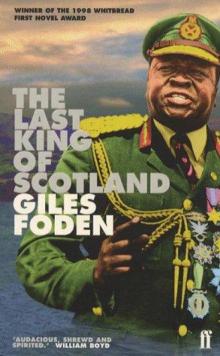 The Last King of Scotland (1998)
The Last King of Scotland (1998)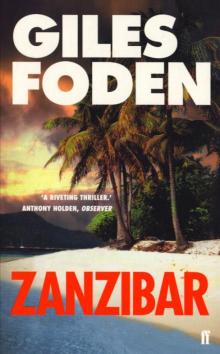 Zanzibar
Zanzibar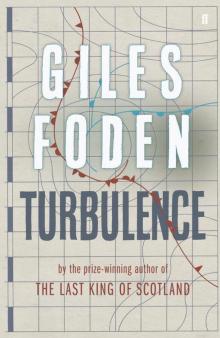 Turbulence
Turbulence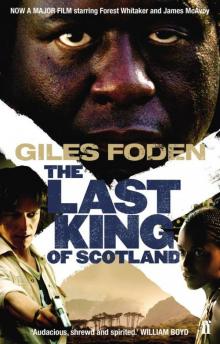 The Last King of Scotland
The Last King of Scotland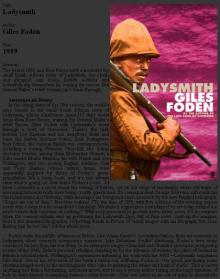 1999 - Ladysmith
1999 - Ladysmith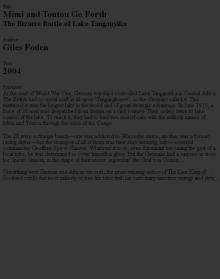 2004 - Mimi and Toutou Go Forth
2004 - Mimi and Toutou Go Forth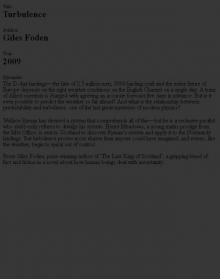 2009 - Turbulence
2009 - Turbulence